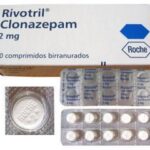Is Clonazepam (Klonopin) Safe During Breast Feeding?

If you’re breast-feeding, you’re giving your baby a healthy start. However, if you need to take medication, you might have questions about the possible impact on your breast milk. Here’s what you need to know about Clonazepam.
Clonazepam, sold under the brand Klonopin among others, is a medication used to prevent and treat seizures, panic disorder, anxiety, and the movement disorder known as akathisia. It is a tranquilizer of the benzodiazepine class. It is taken by mouth. Effects begin within one hour and last between six and twelve hours.
Clonazepam’s effects last about 8 to 12 hours, so the clonazepam dosage for healthy adults is 2 to 3 times a day. It works quickly, usually within an hour, and reaches peak levels by about four hours. The clonazepam half-life is long at 30 to 40 hours. This means it can take several days to rid the body of it.
How should this medicine be used?
Clonazepam comes as a tablet and an orally disintegrating tablet (tablet that dissolves quickly in the mouth) to take by mouth. It usually is taken one to three times a day with or without food. Take clonazepam at around the same time(s) every day. Follow the directions on your prescription label carefully, and ask your doctor or pharmacist to explain any part you do not understand.
Do not try to push the orally disintegrating tablet through the foil. Instead, use dry hands to peel back the foil packaging. Immediately take out the tablet and place it in your mouth. The tablet will quickly dissolve and can be swallowed with or without liquid.
Your doctor will probably start you on a low dose of clonazepam and gradually increase your dose, not more often than once every 3 days. Clonazepam may help control your condition, but will not cure it. It may take a few weeks or longer before you feel the full benefit of clonazepam. Continue to take clonazepam even if you feel well.
Do not stop taking clonazepam without talking to your doctor, even if you experience side effects such as unusual changes in behavior or mood. If you suddenly stop taking clonazepam, you may experience withdrawal symptoms such as new or worsening seizures, hallucinating (seeing things or hearing voices that do not exist), changes in behavior, sweating, uncontrollable shaking of a part of your body, stomach or muscle cramps, anxiety, or difficulty falling asleep or staying asleep. Your doctor will probably decrease your dose gradually.
What side effects can this medication cause?
Clonazepam may cause side effects. Tell your doctor if any of these symptoms are severe or do not go away:
- drowsiness
- dizziness
- unsteadiness
- problems with coordination
- difficulty thinking or remembering
- increased saliva
- muscle or joint pain
- frequent urination
- blurred vision
- changes in sex drive or ability
Some side effects can be serious. If you experience any of these symptoms or those listed in the IMPORTANT WARNING section, call your doctor immediately or get emergency medical treatment:
- rash
- hives
- swelling of the eyes, face, lips, tongue, or throat
- difficulty breathing or swallowing
- hoarseness
- difficulty breathing
If you experience a serious side effect, you or your doctor may send a report to the Food and Drug Administration’s (FDA) MedWatch Adverse Event Reporting program online.
Is clonazepam (klonopin) safe during breast feeding?
Some benzodiazepines are not recommended during breastfeeding because they stay in the body for a long time and might cause sedation (sleepiness) in a breastfed infant. If a benzodiazepine is needed during breastfeeding, it is best to use one that is removed from the body rapidly.
Clonazepam gets into the breast milk in small amounts. Because it can cause sedation (sleepiness) and levels might build up in the infant’s body, it is better avoided. Some babies born to women who take this medication at the end of their pregnancy have more trouble breathing, poor circulation, and low muscle tone (floppy baby syndrome). Not every baby exposed to clonazepam will experience these symptoms.
When possible avoid clonazepam during breastfeeding. Other medications may be preferred while breastfeeding a newborn or an exclusively breastfed infant.
Where can I search for specific medications and their safety in mothers while breastfeeding?
The US National Library of Medicine (NLM) at the National Institutes of Health (NIH) maintainsLactMed® , a database containing information on drugs and other chemicals to which breastfeeding mothers may be exposed.
LactMed includes information on the levels of such substances in breast milk and infant blood, and the possible adverse effects in the nursing infant. Suggested therapeutic alternatives to those drugs are provided where appropriate. All data come from scientific literature and are fully referenced. A peer review panel reviews the data for scientific validity and currency.
The Organization of Teratology Information Specialists (OTIS) provides information, in English and Spanish for women and health care providers on the risks and safety of taking medication during pregnancy and breastfeeding. This group maintains a website called Mother to Baby.
The InfantRisk Center provides up-to-date evidence-based information on the use of medications during pregnancy and breastfeeding. The Infant Risk Center also provides resources such as a hotline, MommyMeds mobile app for consumers, InfantRisk Center mobile app for health care professionals and MommyMeds.com to make accessing safety information simple.
What other information should I know?
Keep all appointments with your doctor and the laboratory. Your doctor will order certain lab tests to check your response to clonazepam. Do not let anyone else take your medication. Clonazepam is a controlled substance. Prescriptions may be refilled only a limited number of times; ask your pharmacist if you have any questions.
It is important for you to keep a written list of all of the prescription and nonprescription (over-the-counter) medicines you are taking, as well as any products such as vitamins, minerals, or other dietary supplements. You should bring this list with you each time you visit a doctor or if you are admitted to a hospital. It is also important information to carry with you in case of emergencies.





